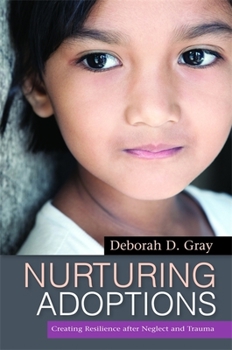Nurturing Adoptions: Creating Resilience After Neglect and Trauma
Select Format
Select Condition 
Book Overview
Adopted children who have suffered trauma and neglect have structural brain change, as well as specific developmental and emotional needs. They need particular care to build attachment and overcome trauma. This book provides professionals with the knowledge and advice they need to help adoptive families build positive relationships and help children heal. It explains how neglect, trauma and prenatal exposure to drugs or alcohol affect brain...
Format:Paperback
Language:English
ISBN:1849058911
ISBN13:9781849058919
Release Date:January 2012
Publisher:Jessica Kingsley Publishers
Length:512 Pages
Weight:1.60 lbs.
Dimensions:1.1" x 6.0" x 8.9"
Customer Reviews
4 ratings
Must-have resource!
Published by Thriftbooks.com User , 15 years ago
Finally, a well respected, prominent professional has used extensive research to address the overuse of the RAD diagnosis and offer alteratives that are evidence based. The title and introduction to the book set the tone, children who have been traumatized must be nurtured rather than coerced. The introduction states this clearly: "Readers familiar with coercive techniques will find them singularly absent from Nurturing Adoptions. The reasons go beyond the widely shared ethical concerns. Coercive techniques are contraindicated due to the effects that neglect and trauma have had on the brains of the children about whom the book was written." While Deborah Gray's first book was excellent, this one is even better. It is both comprehensive and easy to read, an essential resource for a child welfare advocates.
Excellent Trauma/Loss Resource
Published by Thriftbooks.com User , 16 years ago
Deborah D. Gray is the founder of Nurturing Attachments, an organization specializing in treating childhood trauma and loss in ways that are both effective and gentle. I know her both personally and professionally and thoroughly enjoyed her latest book. Just to clear up some misperceptions, Deborah D Gray has never done "holding therapy" and is not an advocate of this practice. The introduction of her book makes this clear, "Readers familiar with coercive techniques will find them singularly absent from Nurturing Adoptions. The reasons go beyond the widely shared ethical concerns. Coercive techniques are contraindicated due to the effects that neglect and trauma have had on the brains of the children about whom the book was written." She sometimes gets "trashed" by members of "anti-holding therapy" movement, who have not adequately researched her work. I am against holding therapy, and that is exactly why I love Deborah Gray's books. She exclusively advocates science based approaches and non-coercive methods of treating children. This new book incorporates a new tool designed to help families and professionals understand how new research on the impact of neglect, abuse, early trauma, and institutionalization on the developing brains of children can guide their practices in new directions. It is an easy read and extremely practical. The only thing I fault about Nurturing Adoptions is the title, it is far too limiting. This is a book about trauma and loss, its value is not limited to adoption issues. It should be read and used by all child welfare advocates.
Amazing, comprehensive work on adoption!
Published by Thriftbooks.com User , 16 years ago
This book contains lots of heady research but I was able to digest most of what Deborah was saying. It reflects the new wave of hope which is just coming ashore in the field of adoption. I highly recommend it!
A "must-have" for social workers, counselors, psychotherapists, and other professionals
Published by Thriftbooks.com User , 16 years ago
Clinical social worker Deborah D. Gray applies her extensive experience counseling adopted children to Nurturing Adoptions: Creating Resilience After Neglect and Trauma, an in-depth examination of both domestic and international adoptions. Written especially to aid professionals working with adoptive families in the twenty-first century, Nurturing Adoptions covers the especial difficulties involved in helping children, from infants to early teens. Chapters discuss the effects of early life neglect and trauma on brain development, how to build attachment, the role of the child welfare or social worker, how to structure careers and practices, and much more. Numerous case studies illuminate this straightforward and accessible resource. "When parents lose sight of normal childhood development, expecting much more than developmental progress allows, there is trouble ahead. The set-up for the child is that the parents will always be disappointed and displeased. The child can never feel like a wanted and accepted child." A "must-have" for social workers, counselors, psychotherapists, and other professionals involved in helping adoptive families adjust.




